While on iHerb 10% discount on omega section, I'm in a hurry to finish the guide to omega 3 supplements fatty acid. There are always a lot of questions, let's try to deal with the species of a large family =)
I wrote about omega 3 fatty acids more than once, useful links below. And today, let's see which omegas to choose first and how to make sense of this world of EPA and DHA abbreviations, which make many people dizzy =))
Let's start with the basics of the basics. Fatty acids are called essential because the body does not produce them itself (like cholesterol and other fats), but only receives them from food!
These are omega 3 and omega 6 acids. They are extremely important for the synthesis of hormone-like substances (prostaglandins), strong immunity and health. of cardio-vascular system, youthful joints and skin!
Balance omega 3 and omega 6
But even more important right balance omega 3 and omega 6 acids in the body perfect option within 1:1 or 1:2.
Then the body works like an ideal mechanism: we are healthy, vigorous, nothing hurts. But the situation is that we eat too little omega 3 fats (wild fish, flax seeds, walnuts) and too much omega 6 fats (sunflower, corn oil, refined foods).
Our balance is 1:16 or 1:20, according to experts.
Too much omega 6 causes a bunch of disorders: chronic inflammation, heart disease, autoimmune diseases, rheumatoid arthritis, depression, and others. chronic diseases. The good news is that when eliminating omega-3 deficiency many diseases disappear!
That's why, everyone needs an extra omega 3 intake and on an almost daily basis.
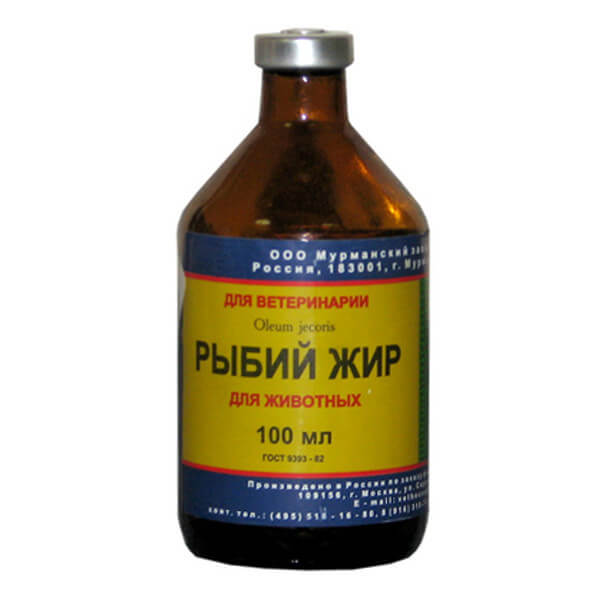
ABC of omega acids
Omega classes main : omega 3, omega 6, omega 7, omega 9.
Omega 3 fatty acids: found in vegetable oils and fish oils. This class includes ALA, EPA and DHA fatty acids.
ALA: alpha linolenic acid. Omega 3 fatty acid. Found in flaxseed oil, descending rapeseed and oil walnut. A source of plant-based omega 3 for vegans. Synthesizes EPA and DHA, but in the presence of the enzyme, the process takes 2 weeks.
EPA: eicosapentaenoic acid. Omega 3 fatty acid. Found in cold water fish and fish oils. Important for a good mood.
DHA: docosahexaenoic acid. Omega 3 fatty acid. Found in cold water fish and fish oils. Plant DHA for Vegans is derived from algae. Important for nervous system, brain and eye health.
Omega 6 fatty acids: found in vegetable oils. This class includes linoleic (LA) and gamma-linolenic (GLA) acids.
LA: linoleic acid. Omega 6 fatty acid. Found in sunflower, safflower, corn oils. It is not necessary to take in supplements, we get in excess with refined foods.
GLA: gamma-linolenic acid. Omega 6 fatty acid. Found in evening primrose oil, borage, blackcurrant oil.
Omega 7: palmitoleic acid. Contained in sea buckthorn oil and some types of fish oil. Improves skin health, lowers cholesterol, reduces symptoms of dry eyes.
Omega 9: oleic acid. Found in olive, almond, sesame oil, avocado and macadamia. Used in the Mediterranean diet, it is good for health and protects the walls of arteries from cholesterol. You don’t need to take it in supplements, it’s better to cook salads and pasta with the freshest olive oil more often =)
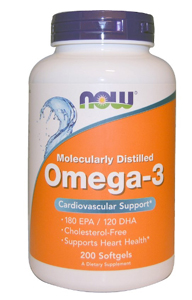
Omega 3 fatty acids
Most studies do not separate the properties of EPA and DHA, because both acids are part of fish oil and work together too. However, each acid has its own special properties.
It's interesting that EPA and DHA support telomere length, protective ends of chromosomes! And the length of telomeres is a marker of biological aging of the organism.
Action of omega 3 fatty acids:
– prevention of cardiovascular diseases (arrhythmia, protection of arteries, prevention of blood clots and heart attacks)
– anti-inflammatory action + joint health
- strong immunity
- heals acne and eczema caused by hormone imbalances
- chronic fatigue syndrome, recovery from the virus (in combination with GLA)
— slows down aging by maintaining telomere length, protective ends of chromosomes
- dosage of omega 3 for adults: optimally 500 - 600 mg EPA + DHA in total for prevention, dosages from 1000 mg go for treatment
- dosage of omega 3 for children: depends on age
My choice of supplements:
— Now Foods Omega-3: enteric coated capsules (anti burping), 300mg EPA + DHA
— Madre Labs Omega-3 Premium fish oil
: most a budget option, 600 mg EPA + DHA
— Now Foods Omega-3 Mini Gels: small capsule size, 600mg EPA + DHA
— Natural Factors, Rx Omega-3 Factors: Canadian omega 3, 600 mg EPA + DHA
— Natural Factors, Whole Earth & Sea: vegetable omega 3 from algae, 450 mg EPA + DHA

EPA Benefits
EPA acid has an anti-inflammatory effect, necessary for emotional balance and keep you in a good mood! EPA deficiency leads to depression, stress and loss of interest in life.
Used in the treatment of depression and all emotional disorders. Interestingly, the tendency to depression is associated with the development of heart disease, perhaps the root of the problem is one: a deficiency of omega 3 acids in the body.
EPA action:
- forms prostaglandins E3: affect the health of the cardiovascular system
- anti-inflammatory action
- used in the treatment of depression
My choice of supplements:
— Country Life Omega 3 Mood: for a healthy brain and wellness, research on it
— Barlean's, Ultra EPA, Fish Oil Omega-3: high content EPA

DHA Benefits
DHA is important for brain and eye health. It is vital for pregnant women for the normal development of the nervous system, brain and retina of the unborn child.
It is also needed by newborns for proper development and visual acuity (infants make up for the lack with mother's milk). Children who get enough DHA show better development and a larger vocabulary among their peers.
Action of DHA:
- forms resolvins and protectins: powerful blockers of inflammation
-important for brain and eye health
- necessary for the proper development of the unborn child, infants and children
- prevention of postpartum depression in the mother
- lowers triglycerides and raises good cholesterol
My choice of supplements:
— Garden of Life, Oceans Kids: children's chewable DHA for children 3 years and older
— Now Foods, Kid's Chewable DHA: children's chewable DHA
— Now Foods DHA-500: double concentration of DHA with enteric coating (does not leave fishy taste)
— Flora, DHA Vegetarian Algae: Vegetable DHA from Algae for Vegans

ALA beneficial properties
Flaxseed oil is the most important source of alpha-linolenic acid. ALA has anti-inflammatory properties and stimulates the immune system + is good for the cardiovascular system.
Although fish fat acts more efficiently and faster, flaxseed oil is great for daily use. That's why optimally combine the intake of fish oil with flaxseed oil.
The benefits of flaxseed are in the content of lignans: anti-cancer substances that deactivate the types of estrogen that are dangerous for cells. The combination of omega-3 with lignans helps prevent breast tumors and other forms of cancer associated with female sex hormones.
Action ALA:
– cardiovascular health, lowering cholesterol
- prevention of women's diseases
— smoothes hormonal fluctuations
- reduces monthly PMS
- daily dosage from 1 teaspoon to 1 tablespoon linseed oil with lignans. For treatment, use up to 3 tablespoons
My choice of supplements:
— Now Foods Flax Seed Oil, High Lignan: organic flaxseed oil with lignans
— Flora, Udo's Choice, Udo's Oil High Lignan: organic blend of oils with lignans

GLA benefits
Gamma Linolenic Acid can be synthesized independently from omega 6, but only if there is no deficiency of vitamins C and group B, zinc and magnesium. GLA synthesis decreases with age, with sugar and alcohol consumption, and viral infections.
Therefore, it is important to take magnesium and zinc (which are always lacking) + periodically take courses of GLA in capsules, making up for the deficiency of useful omega.
GLA action:
- forms prostaglandins E1: protection against aging, stimulate hair growth
- stimulates healthy levels of immune factors: interleukin-1 beta and T-cells
– joint health, improves arthritis
– lower cholesterol (400 mg GLA + omega-3)
- chronic fatigue syndrome, recovery from the virus (in combination with EPA)
— relieves PMS symptoms after three months of intake (dosage of 300 mg GLA)
- very effective for eczema (lasting results after 3-6 months of use, dosage 300-500 mg GLA)
- improves skin condition in atopic dermatitis (dosage 360 mg GLA)
- restores nails with brittleness and delamination (dosage 270 mg GLA)
My choice of supplements:
— Now Foods, Borage Oil: 240 mg GLA per capsule
— Solgar, Evening Primrose Oil: 117 mg GLA per capsule
— Now Foods, Evening Primrose Oil: 120 mg GLA per capsule
— Natural Factors, WomenSense, RxOmega-3 for women: all types of omega-3 + GLA
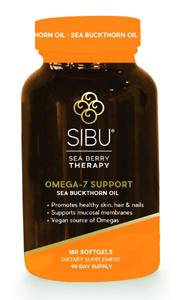
Omega 7 fatty acids
Omega 7 acids are found in extracted sea buckthorn oil and certain fish oils. Sea buckthorn oil is obtained by extraction with carbon dioxide and the palmitic acid is removed, leaving the purest palmitooleic acid for ingestion.
Manufacturers use clinically studied extracts of sea buckthorn SBA24 (EuroPharma brand) and Provinal (Barlean’s brand), Siby Beauty makes its own CO2 extract.
Omega 7 action:
- anti-inflammatory, joint health
– prevention of cardiovascular diseases
— increases skin hydration and elasticity, regeneration
Helps treat and prevent acne
- very useful for rosacea and chronic inflammation of the skin
- reduces dry eye syndrome including redness and burning
- reduces dryness of the skin and mucous membranes in menopausal women
– there is evidence that reduces appetite and gives the body a signal to stop the accumulation of fat
My choice of supplements:
— Sibu Beauty Omega 7 Supplement: extract and oil from Himalayan sea buckthorn berries
— Barlean's, Omega Swirl, Joint Remedy: I ordered omega-7 with hyaluronic acid for skin and joints
These are omega 3 fatty acids, I’m tired of writing such a long post, but I’m again convinced of how useful they are for the body and hormonal balance =)
The benefits of polyunsaturated fatty acids for the body have been known for 100 years. But the need to eat them was discussed only in last years. The richest sources of healthy fats - this has long been considered a healing product, and despite the similarity of the composition and useful properties, these two products still differ in taste and results of application. And many fans healthy eating worries about the question: what is better - fish oil or
Benefits of fatty acids
Human brain cells are 60% fatty acids. Most of them are synthesized in the body, but there are two essential acids that can only be obtained from food: alpha-linoleic and linoleic. With their lack, diseases such as hypertension, diabetes, cancer develop, vision and brain function deteriorate. But not everything is for the body. Most of them in the human diet are hydrogenated. On the contrary, they interfere with normal nutrition and cell function, contribute to an increase in cholesterol levels and a deterioration in the functioning of blood vessels.
Studies have shown that Omega 3 is very useful for the body. It is they who improve the functioning of the brain and blood vessels. Most of these acids are found in linseed oil and fish oil. But their composition is slightly different. Fish oil contains long chain acids that are most beneficial to humans. And flax oil is a source of alpha-linoleic acid.
Action of fatty acids
Fats especially necessary for health are Omega 3. A person can get several of them from food:
- alpha-linoleic acid;
- exapentaenoic;
- docosahexaenoic.
All of them are equally useful, but still differ in function. From alpha-linoleic acid, the body can synthesize the rest of the Omega 3. It is found in plant foods. EPA and DHA can be obtained from fatty varieties fish. Therefore, it is difficult to answer the question of which is better: fish oil or linseed oil.
These substances must constantly enter the body. After all, even small doses of them have such an effect: 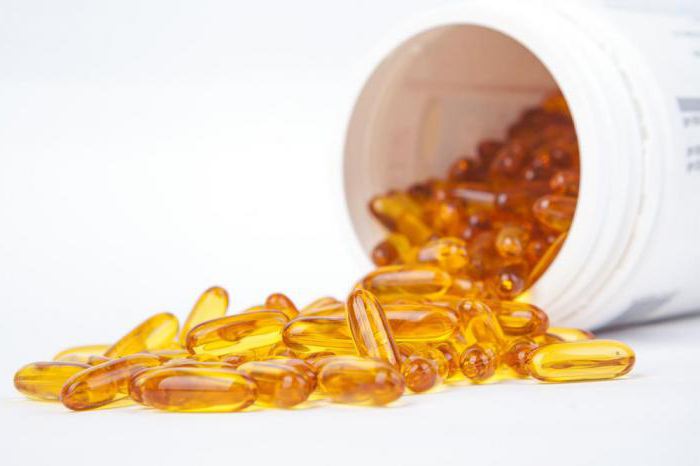
- preserve and restore cell DNA telomeres, which increases human life expectancy;
- improve the functioning of the heart and blood vessels;
- give energy for the transmission of nerve impulses, which optimizes mental activity;
- improve the condition of the skin and hair;
- they are necessary for the normal development of children.
Fish as a source of fatty acids
This useful product extracted from marine fish, which is rich in Omega 3. It is mainly salmon, sardine, herring and tuna. Only 100 grams of such fish are able to provide the body with the necessary amount of fatty acids. But recently, during the processing process, mercury is often found in fish. It is believed that it enters the body of fish from polluted sea water. This substance often becomes contaminated and fish oil. Manufacturers hide this fact after all and so it has become less popular lately.
The benefit of fish oil is that it is the source of the most beneficial acids Omega 3 - eicosapentaenoic and docosahexaenoic. It is they that have a beneficial effect on the brain, ensuring its normal blood supply, improve fat burning in the body and maintain visual acuity. 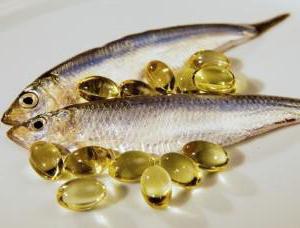
How to use fish oil?
This substance has the properties medicines. Therefore it has its side effects and contraindications. In case of an overdose, problems with blood clotting and wound healing may occur. It is not recommended for diabetics, people with disabilities thyroid gland and kidney stones. It is undesirable to drink fish oil on an empty stomach and together with blood thinners. It is best to use it in capsules, strictly following the instructions and not exceeding the dosage.
The composition of this product is slightly different from fish oil. It contains alpha-linoleic acid (ALA). It is also useful for the body, but stimulants of brain activity, the work of the cardiovascular system and metabolic processes are acids with a longer molecular chain. These are eicosapentaenoic and docosahexaenoic acids found in fish oil. From linseed oil, the body can get them, but the synthesis goes at a different rate in different people. Worst of all, it is processed in the body of men and in the presence of other polyunsaturated fats. But the effect of flaxseed oil is still good for health:
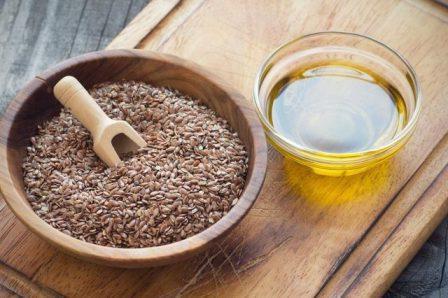
How to eat flaxseed oil
Since ancient times, this product has been indispensable on the table of every person. It was added to salads, first and second courses, taken with various diseases. Flaxseed oil, which has a very healthy composition, can be mixed with sour cream and other products to make a sauce. But it is very important that it is not exposed to temperature, in which alpha-linoleic acid decomposes and becomes harmful to health.
To obtain required amount polyunsaturated fats, a tablespoon of oil per day is enough. FROM medicinal purposes it is better to drink it half an hour before meals. You need to buy flax oil in a pharmacy, packaged in dark glass bottles. 
Which is better: fish oil or flaxseed oil?
In fact, these products have different properties. EPA and DHA, essential for brain health, are found in fish oils. When synthesized from linseed oil, they are much smaller in number and have slightly different qualities.
To figure out which is better: fish oil or flaxseed oil, you need to consider the differences between these products:
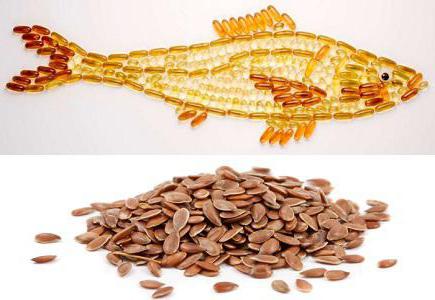
Can fatty acids be harmful?
While omega 3s are good for health, both flaxseed oil and fish oil can be harmful if used improperly. First of all, consuming them in large quantities can cause severe indigestion and even poisoning. These fats can also become harmful if stored improperly. Upon contact with air and light, they form carcinogens. These oxidized fats can destroy the cells of vital organs, which accelerates the aging of the body. In addition, with strong and prolonged heating, as with deep frying, Omega 3 is converted into substances that can cause cancerous tumors. 
How to provide the body with fatty acids
To all useful material well absorbed, you need to use both flaxseed oil and fish oil. But it is important to consider that the alpha-linoleic acid found in flax seeds can only be converted to other fatty acids in women. Therefore, men should give preference to fish oil. And to fully provide the body with the necessary substances, it is desirable to use both products. If there is a danger of getting a portion of mercury from marine fish, you can switch to fish oil capsules. And for those who do not like the smell and taste of linseed oil, you can add flax seeds to your food.
It is difficult to answer the question - which is better: fish oil or linseed oil. They are equally healthy, but have their own advantages and disadvantages. Therefore, it is better to consume both fatty fish and flax oil in reasonable quantities.
Fish oil, flaxseed oil are the main sources of omega-3 fatty acids. The intake of these funds has a beneficial effect on the work of the whole organism. To understand which product to choose fish oil or flaxseed oil and which is better, you should study the main characteristics of each of the drugs.
Instructions for use
Fish oil is a complex of vitamins, as well as fatty acids of animal origin, which are able to regulate lipid metabolism.
Operating principle
The value of fish oil in essential omega-3 fatty acids, as well as docosahexaenoic and eicosapentaenoic acids.
With sufficient intake of Omega-3, it is possible to prevent the development of serious diseases of the cardiovascular system, as well as atherosclerosis. In addition, this product of animal origin has beneficial effect to work immune system.
It should be noted that omega acids are active participants in the synthesis of eicosanoids, thanks to which all metabolic processes in the body are regulated. human body(production of hormones, increased body temperature, changes in blood pressure, etc.)
Regular consumption of fish oil contributes to blood thinning, which, in turn, prevents the formation of blood clots and serves as a kind of prevention of a heart attack. Docosahexaenoic and eicosapentaenoic acid normalize blood pressure indicators, form specific protection for blood vessels, preventing the formation of cholesterol plaques.
The principle of action of fish oil can be compared to some extent with the mechanism of action of certain drugs that are prescribed for a number of CVS diseases. But unlike medicines, fish oil does not provoke the development of multiple side effects.
Release form
 The drug is produced in the form of an oil solution (50, 100 ml), as well as gelatin capsules (200, 300, 500, 1000, 1400 mg) with a liquid yellowish content. The aroma of the solution and capsules is characteristic - fish.
The drug is produced in the form of an oil solution (50, 100 ml), as well as gelatin capsules (200, 300, 500, 1000, 1400 mg) with a liquid yellowish content. The aroma of the solution and capsules is characteristic - fish.
Indications
- Prevention of hypovitaminosis conditions
- Compensation for the lack of omega-3 fatty acids and vit. E.
Contraindications
There are a number of contraindications, in the presence of which the use of fish oil should be excluded, these include:
- Allergy to fish or to the component of the drug itself
- Thyroid diseases
- Kidney pathologies
- Diseases of the urinary system
- Tuberculosis of open form
- Elevated levels of Ca, as well as cholesterol in the blood
- Pregnancy
- breastfeeding period.
The drug is intended for oral administration. The daily dosage is calculated taking into account the age of the patient.
For children from 3 to 7 years - three times a day, 300 mg.
Children from 7 to 14 years old should take 2 capsules of 300 mg or 1 capsule of 500 mg three times a day.
Adults and children over 14 years old - 3 capsules of 300 mg three times a day or 2 capsules of 500 mg (1 teaspoon of oil) twice a day.
Capsules should be washed down with a sufficient amount of water. The duration of taking dietary supplements is 1 month.
Side effects
During the use of this drug, allergic reactions may occur, a decrease in the rate of blood clotting is possible.
Storage
Fish oil should be stored at a temperature not exceeding 25 ° C in a dry and well-protected place from sunlight. BAA is suitable for use for 2 years from the date of manufacture.
Price and country of origin
The drug is manufactured both in Russia and abroad. The cost varies depending on the dosage and form of release and is 29 - 1274 rubles.
Instructions for use of linseed oil
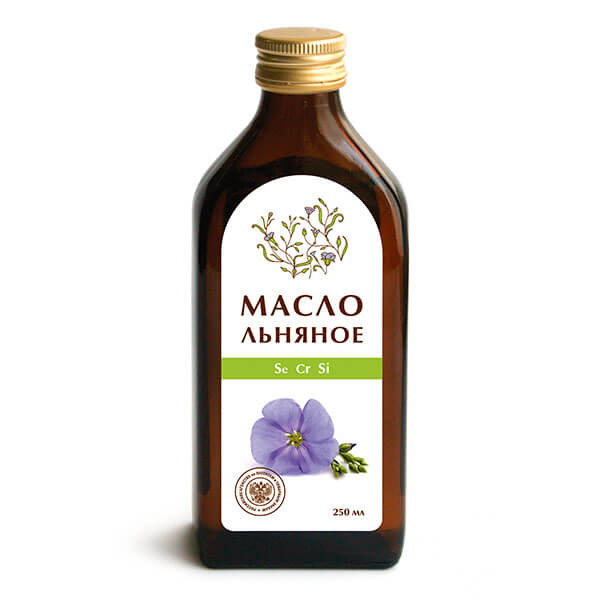 Linseed oil - essential product containing vitamins, nutrients, and unsaturated fatty acids.
Linseed oil - essential product containing vitamins, nutrients, and unsaturated fatty acids.
Operating principle
Flax is a plant from which valuable vegetable oil is produced. regular use it is possible to prevent cardiovascular disease, thrombosis.
If you take flaxseed oil daily, blood viscosity will decrease, cholesterol levels in the blood will normalize, and the load on the heart will significantly decrease.
The use of linseed oil will serve as an excellent prevention of the development of pathological neoplasms in the mammary gland, will facilitate the course of PMS, as well as the menopause period. In addition, flax improves the condition of the skin and hair, accelerates regeneration processes.
Flaxseed oil has a mild laxative, diuretic effect, exhibits bactericidal and anti-inflammatory properties.
EFAs have a positive effect on the transmission of nerve impulses, while eliminating numbness, tingling in the upper and lower extremities.
Release form
Release form - capsules and oil. Capsules are available in dosages of 300, 750, 1350 mg; oil - in bottles of 250 and 500 ml
Indications
Flaxseed oil is indicated in such cases:
- Lipid metabolism disorder
- Diseases of the CCC
- Thyroid disease
- Acute course of diseases of the digestive tract
- Diabetes
- Hypercholesterolemia
- Violations of the work of the National Assembly
- Hyperlipidemia
- Immunodeficiency states
- Impotence.
Contraindications
- Acute bowel disease
- Cholecystitis
- Chronic pancreatitis
- Taking antiviral drugs, COCs, and antidepressants
- Gallstone disease.
How to replace the drug with such contraindications, it is worth checking with the doctor.
Dosage and method of application
Side effects
In rare cases, allergic manifestations can be observed.
Storage
The shelf life of linseed oil is 1.5 years.
Price and country of origin
Linseed oil is produced in Russia. The price of oil, as well as capsules: 31 - 268 rubles.
Fish Oil vs. Flaxseed Oil: A Comparison
Although each of the drugs is a source of PUFAs, they have some significant differences.
Composition
Flaxseed oil contains almost twice as many vitamins as fish oil. That's why herbal product It is recommended to use for the prevention of hypovitaminosis conditions.
Fish oil contains eicosapentaenoic and docosahexaenoic acids, which are not found in flax seeds.
Flax seed oil contains both Omega-3 and Omega-6. The product of animal origin is enriched only with Omega-3.
By action
Both drugs have a beneficial effect on metabolic processes, improve the activity of the immune system, and prevent the development of hypovitaminosis.
Flaxseed oil is a good weight loss supplement.
By release form
Produced in the same dosage forms.
According to the scheme and duration of admission
The daily dosage of both drugs for adults is almost the same.
According to contraindications
Both agents are contraindicated for use in cholelithiasis. In addition, they reduce blood viscosity, so some patients will need to use anticoagulants.
Flaxseed oil is contraindicated for children under 5 years of age.
Reception of fish oil is contraindicated in renal failure and nephrourolithiasis. Therefore, it is best to replace fish oil with a vegetable analogue.
By price and country of origin
The price of drugs varies significantly. The price of fish oil exceeds the cost of linseed oil by several times. Each of them is made by a domestic manufacturer, can be purchased at any pharmacy.
Brain cells are 60 percent fat, a much higher concentration than in other parts of the body. The irony is that people hardly know this and are constantly striving to eliminate as much fat as possible from their diet, even though having enough fat in your diet is vital for brain development and keeping it in good shape.
There are two essential fatty acids, alpha-linolenic acid, called "Omega-3", and linoleic acid, called "Omega-6". They are called "essential", or vital, because the body forms all the other necessary fats from them.
It is the fat that we most need, namely alpha-linolenic acid, that is least and least often included in our diet. Essential fatty acid deficiency is one of the main causes of chronic degenerative diseases such as cancer, heart disease, hypertension and insulin. In addition, without these essential fatty acids, brain function is also impaired. While we probably eat a lot of fat, it's usually the wrong type of fat from beef and hydrogenated oils. Partially hydrogenated fats and oils contain toxic fats that can be harmful to the brain.
In the process of hydrogenation, hydrogen is introduced into fat molecules, which changes their structure and makes such fats dangerous for health and full-fledged mental activity. When hydrogenated fat enters the cell wall, it begins to interfere with the transfer of nutrients through the wall into the cell. As a result, there is an accumulation of toxins and the cells do not receive adequate nutrition. Hydrogenated fat is also called saturated because the chains of molecules are saturated with hydrogen atoms.
Due to its resistance to rancidity, it is widely used in the manufacture of margarine, cooking oils added to dough for crispiness, various sauces and mayonnaises for salads and vegetables. Most nutritionists recommend avoiding hydrogenated fats and using natural, fresh vegetable oils made from grains, various seeds, and seeds. Considering that fat is the building block of brain cells, it makes sense to use natural vegetable oils and avoid those fats and oils that have been restructured by hydrogenation.
However, just because fats are natural and unprocessed still doesn't mean they're really good for you. There are three types of natural oils: saturated, polyunsaturated, and monounsaturated. Studies have shown that saturated fats contribute to high cholesterol levels, the occurrence of cardiovascular disease, cancer and other serious diseases. Saturated fats easy to recognize because they become hard and matte in the cold.
Animal fats are saturated. They look like hard white veins in a piece of meat and are easy to see and separate. Polyunsaturated fats, which are used in many salad dressings, remain clear and runny even in the refrigerator. But polyunsaturated fats have their own dangerous properties which are not widely known. These fats are extremely susceptible to oxidation, especially when heated and left in the air.
We most definitely do not want to allow oxidized fats into our body, because they create free radicals that destroy the cells of the nervous system and other vital organs, which leads to mental decline, accelerated aging processes and the occurrence of cancer.
If polyunsaturated oils and fats smell rancid, do not eat them. Unfortunately, most deep-fried foods, such as french fries, use rancid oil with carcinogenic properties. Just think about it. They are fried in the same oil over and over again and are sometimes kept open in the air for days on end. An intermediate place between saturated and polyunsaturated fats is occupied by monounsaturated fats. Monounsaturated fats include olive oil, canola oil, and peanut oil.
Linolenic acid, or Omega-3, provides a quick supply of needed energy to help carry impulses that carry a signal from one cell to another. When we speed up signaling, it helps us think better, store information in memory, and retrieve it from there as needed. This substance is also necessary for the embryo developing in the mother's womb. In animal experiments, researchers found that babies had irreversible learning disabilities if their mothers lacked the essential omega-3 fatty acid. This fatty acid is essential for a healthy retina, synapse function, and stress management.
flax seeds, pumpkin seeds, wheat germ, soybeans, canal, nuts and oils from them are the best sources of unsaturated oils. They should always be kept in the refrigerator and used only fresh, because fats containing linolenic acid are destroyed by heat, light and contact with atmospheric oxygen.
Salmon, mackerel, trout, sardines, tuna, and eel are good sources of Omega-3s. In fact, any fish oil is an excellent source of omega-3 fats. Primrose oil, or primrose, - good source essential fatty acid Omega-6 along with flaxseed oil.
Linseed oil
One of the first agricultural crops that man began to cultivate in ancient Egypt and India was flax. For many centuries, flax has clothed and fed people. If bread is the head of everything, then we will not be mistaken in saying that flax is the soul of everything. Linen has always been a special culture in Russia, it fed, healed, warmed the body and soul.
And without linseed and hemp oil, you won’t eat cabbage or potatoes during fasting. This is how vegetable oil is now called - vegetable oil. If you look into V. Dahl's dictionary, we will read: "... oil ... linseed, hemp or lean. Vegetable oil is beaten: the seed is crushed, sometimes it is fried and put under the pulp, in the oil mill. It is true that the oil is all at the top! Swede without oil! Oil will not be born by itself."
Everyone knows and medicinal properties flaxseed and oil. AT folk medicine they are used for worms, heartburn, various ulcers. Modern studies have shown that eating flaxseed oil reduces the risk of stroke by 37%. Flaxseed oil is twice as rich in unsaturated fatty acids as fish oil. In general, you can live like clockwork, and not be afraid of such terrible diseases as diabetes, atherosclerosis, coronary heart disease, and many others.
Nutritionists usually recommend flaxseed oil as the most easily digestible and most beneficial, especially for people with impaired fat metabolism. Indeed, there is great amount diseases in which linseed oil and the Omega-3 and Omega-6 contained in it are necessary for the body. This is especially important for women. Unsaturated fatty acids contained in linseed oil must be present in the diet of pregnant women for the proper formation of the brain of the unborn child. Flaxseed oil helps to normalize fat metabolism and seemingly unattainable weight loss with a complete rejection of the use of fats, with the consumption of flaxseed oil becomes a reality.
The use of flaxseed oil is very important for vegetarians and people in whose diet there is no fish, the fat of which contains unsaturated fatty acids. The content of unsaturated fatty acids linseed oil is superior to fish oil.
It is especially useful to use flaxseed oil for dressing. fresh salads and vinaigrettes. It can be mixed with sour cream, mayonnaise and other ingredients for making sauces. Linseed oil can be seasoned with any porridge, boiled potatoes, add to the first and second courses. It is very tasty and healthy to mix linseed oil with cottage cheese and herbs.
Flaxseed oil, obtained by cold pressing, is an indispensable product in our diet, participating in many metabolic processes of our body, necessary for the prevention and complex treatment of diseases such as stroke, atherosclerosis, coronary heart disease, diabetes, cancer and many others. In terms of the content of unsaturated fatty acids Omega-3 and Omega-6, flaxseed oil exceeds the products of the usual diet and only 1-2 tablespoons of flaxseed oil provide the daily need for unsaturated fatty acids.
I am glad to welcome you on my site Youth of face, body and soul. Today on the agenda in the rubric Vitamins for youth and Benefit in everything compound vegetable oil . What's in vegetable oil composition includes a large list of various vitamins: E, C and micro and macro elements (potassium, sodium, calcium, iron ...) everyone knows or at least guesses. Now it has become very fashionable to use terms in relation to fats: Omega 3,6,9 fatty acids. Few people know the difference between these three numbers, but many tend to eat these Omegas more often. The common belief is that all "Omegas" live in oily sea fish and in olive oil. But is olive oil really the best and only source of Omega 3, 6, 9? fatty acids. I present to your attention the Rating of the usefulness of vegetable oil, the composition of which was analyzed in terms of the content of fatty acids in it.
First, a little theory. Enjoy exploring the difference in structure fatty acids, their molecules, bonds, relationships with each other, only a true chemist can, so take my word for it: unsaturated fatty acid have a positive effect on the structures of the walls of blood vessels, improve them, ensure the work of the immune system on optimal level, do not allow cholesterol to settle on the walls of blood vessels and accumulate in the body, actively participate in the synthesis of various hormones and much more, keeping us young, healthy and beautiful for decades. Normal metabolism in the body is provided, including unsaturated fatty acids, and the shell of any cell without them will not form at all.
Now remember three concepts in the composition of vegetable oil:
- Omega-9 fatty acids - oleic acid.
- Omega-6 fatty acids - linoleic acid and gamma-linolenic.
- Omega-3 fatty acids - alpha-linolenic acid.
Omega-9 fatty acids.
Oleic acid reduces total cholesterol levels, while increasing the level of "good" cholesterol, and reducing blood levels of "bad" cholesterol), promotes the production of antioxidants. Prevents atherosclerosis, thrombosis, aging. If the composition of vegetable oil contains a lot of oleic acid, then fat metabolism is activated (it helps to lose weight), the barrier functions of the epidermis are restored, and more intense moisture retention in the skin occurs. Oils are well absorbed into the skin and actively contribute to the penetration of other active components into its stratum corneum.
Vegetable oils, which contain a lot of oleic acid, oxidize less, even at high temperatures they remain stable. Therefore, they can be used for frying, stewing and canning. According to statistics, residents of the Mediterranean region, who constantly consume olive oil and avocados, nuts and the olives themselves, are much less likely to suffer from diseases of the cardiovascular system, diabetes and cancer.
- Almond - 83%
- Olive - 81%
- Apricot - 39-70%
For comparison - in sunflower oil 24-40%.
Fatty acids Omega-6.
They are part of cell membranes, regulate the level of various cholesterol in the blood. They treat multiple sclerosis, diabetes mellitus, arthritis, skin diseases, nervous diseases, protecting nerve fibers, cope with premenstrual syndrome, maintain skin smoothness and elasticity, strength of nails and hair. With their deficiency in the body, the metabolism of fats in tissues is disrupted (then you will not be able to lose weight), disruption of the activity of intercellular membranes. Also, a consequence of the lack of Omega-6 are liver diseases, dermatitis, atherosclerosis of blood vessels, and the risk of cardiovascular diseases increases. The synthesis of other unsaturated fatty acids depends on the presence of linoleic acid. If it does not exist, then their synthesis will stop. Interestingly, with the consumption of carbohydrates, the body's need for products with the content of unsaturated fatty acids increases.
- safflower - 56 - 84%
- walnut - 58 - 78%
- sunflower - 46 - 72%
- corn - 41-48
For comparison - in olive oil - 15%.
Omega-3 fatty acids.
Omega 3 is vital for normal functioning brain. With their help, there is an influx of energy necessary for the transmission of signal impulses from cell to cell. Keeping mental abilities at a decent level and the ability to store information in memory, actively use your memory - all this is impossible without alpha-linolenic acid. Omega-3s also have protective and anti-inflammatory functions. They improve the functioning of the brain, heart, eyes, lower cholesterol, affect the health of the joints, they are excellent antioxidants. They improve eczema, asthma, allergies, depression and nervous disorders, diabetes, hyperactivity of children, arthrosis, cancer…
- linen - 44%
- cotton - 44%
- camelina - 38%
- cedar - 28%
For comparison - in olive oil - 0%
Results.
Omega-3 and Omega-6 have one very important drawback - when fats are heated and when interacting with air, they are actively oxidized. Education is going on a large number toxic oxides and free radicals that negatively affect the entire body. Therefore, if the composition of vegetable oil is rich in Omega-3 and Omega-6 - fry this oil is not allowed. And store it in a dark, cool place in a closed container.
It is not clear why in all stores there are bottles sunflower oil stand on racks under light bulbs! Pay attention to expiration dates! Fry in olive oil only!
An adult human body can only synthesize Omega-9 itself. And Omega-3 and Omega-6 can only come with food.
Vegetable oils, the composition of which includes all Omegas.
Omega-9/Omega-6/Omega-3.
- Grape oil 25/70/1
- Kedrovoe 36/ 38/18-28
- Hemp 6-16/65/15-20
- Sesame 35-48/37-44/45-57
- Linen 13-29/15-30/44
- Sea buckthorn 23-42/32-36/14-27
- Walnut 9-15/58-78/3-15
- Sunflower 24-40/46-72/1
- Ryzhikovoe 27/14-45/20-38
- Soybean oil 20-30/44-60/5-14
- Cotton 30-35/42-44/34-44
Since to catch the balance of consumption of the necessary fatty acids not very simple, the best solution is diversity. Don't stop at one oil, try others! fans olive oil, note that there is little Omega-6 in it, and there is no Omega-3 at all, which the body cannot synthesize itself. Diversify your diet!
Consumption rate vegetable fat- at least 30 grams per day.
P.S. If you abuse Omegas, then you can earn yourself:
- high blood pressure
- vasoconstriction
- decreased immunity
- activation of inflammatory processes
Yes, and I also want to clarify, the article considered vegetable oil composition which can be taken internally. There are more valuable compositions oils that can only be applied to the skin.


